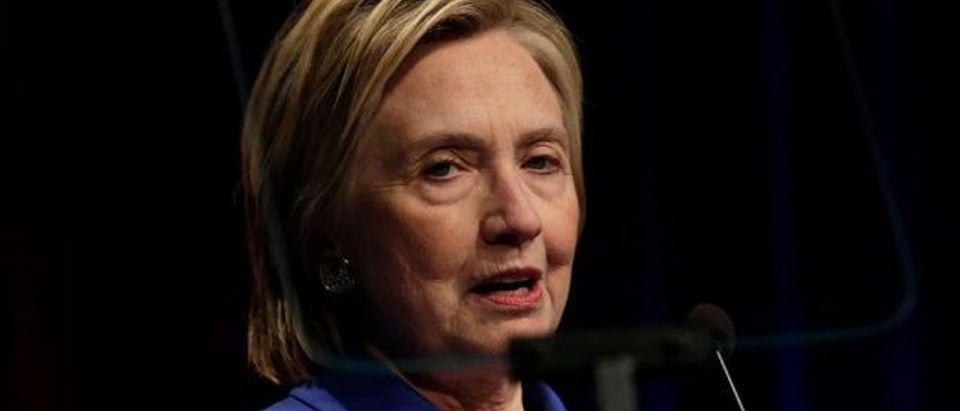While the pollsters and political science professors scramble to save face following their failures to predict Donald Trump’s presidential victory, the rest of us are left to ponder what may be the most disturbing result of all: that Hillary Clinton, despite her corruption in public office, got the most popular votes. Judging by how others have been incarcerated for less, Mr. Trump was spot-on in declaring that Mrs. Clinton should be in prison. With the surge in new revelations about the Clintons’ misuses of public power for personal gain—most glaringly in their willingness to risk exposing our classified secrets to outside hackers in order to conceal the “pay-for-play” dealings with foreign powers that enabled them to amass a sizeable fortune—it defies all notions of justice and fairness to imagine that she should be allowed to walk away with impunity.
The calls from various pundits for Mr. Trump to let bygones be bygones, by forgoing an independent prosecutor and instead giving Mrs. Clinton a pardon, are conveying entirely the wrong message. Of course, we all are exhausted by the recent campaign cycle, and we’d appreciate a break from the seemingly endless acrimony. But the Clintons’ wrongs were more than misguided political decisions; they constitute serious crimes, including felonies that do not require proof of criminal intent (despite the legally incompetent assertions of FBI Director Comey to the contrary). Indeed, if a grand jury investigation were opened, the misuse of classified information that by itself merits prosecution likely would be eclipsed by the Clinton Foundation’s shenanigans, which could warrant criminal and civil RICO actions possibly resulting in lengthy prison time and the forfeiture of all ill-gotten gains—because that’s how the rule of law works.
If we want to show our children, our immigrants, and the rest of the world that we really mean it when we say that no one in America is above the law, here is our chance. And it couldn’t come at a better time. The fact that Mrs. Clinton lost the presidency means that we will be spared the drama of investigating a sitting President. But the fact that she won the popular vote, despite the common knowledge that she is a crook, means that we have much work ahead of us to counter Americans’ growing tolerance for public corruption, a downward trend long in the making.
To appreciate this, let’s take a trip back in time, to 1974. The peoples of other nations were astonished to behold how intolerant we were of the misdeeds of President Richard Nixon and Vice President Spiro Agnew, Republicans who had won a landslide reelection just two years earlier. Agnew was forced to resign because of newly-revealed evidence of his prior misdeeds in public office in Maryland. And Nixon was likewise dispatched for covering up the infamous burglary of the Democratic Party offices at the Watergate Hotel during the 1972 campaign—a burglary in which he played no known direct role. Our refusal to abide their corruption came on the heels of our outrage over Democratic President Lyndon Johnson’s dissembling about the Vietnam War, resulting in his withdrawal from the 1968 presidential race (after having won his own landslide victory in 1964).
Returning to the present, it is painful for many of us to witness how far we’ve descended from where we were before. This coarsening of moral integrity must be laid at the feet of the Clintons, dating back to Bill’s perjury and obstruction of justice that led to his impeachment and disbarment, and of Barack Obama, for allowing the FBI and the Department of Justice to be corrupted to abet Hillary’s candidacy.
Our downward spiral will only be intensified by the Obama legacy of open borders and sanctuary cities, which has allowed millions of persons whose values are unknown to us to emigrate from nations in which public corruption is not only widespread but accepted as the normal way of living and doing business. This banana-republic tolerance for public corruption will be added to our own.
If we want the many blessings of civilization—in which our persons and property rights are protected, our government leaders are subject to the same laws as the rest of us, and our disputes are resolved peacefully according to those laws—then we have to insist that our laws be enforced evenhandedly. The very notion that we would wave goodbye to a pardoned Hillary Clinton as she and Bill head home to live like royalty—while we force our military personnel, including a general, to face prison sentences for a fraction of Hillary’s wrongdoings—is the most immoral message we can send.
Blaine Winship is the author of Moralnomics: The Moral Path to Prosperity (Moralnomics Press), available in e-book from amazon.com and barnesandnoble.com. and in hardcover from moralnomics.com. Winship was the lead trial counsel for 26 states in their historic lawsuit challenging ObamaCare.


